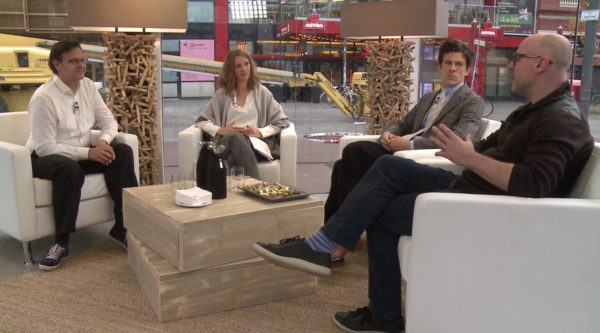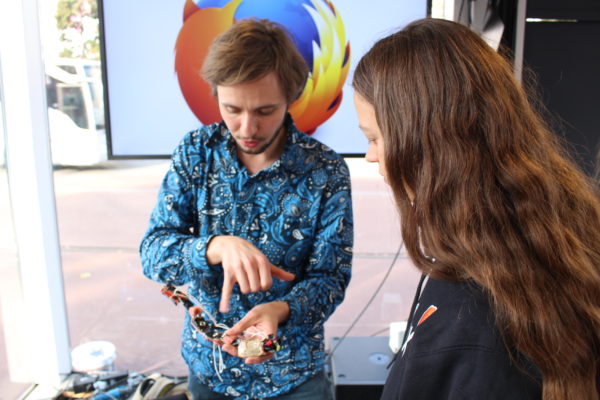Today, online privacy and threats like invisible tracking from third parties on the Web seem very abstract. Many of us are either not aware of what’s happening with our online data or we feel powerless because we don’t know what to do. More and more, the Internet is becoming a giant glass house where your personal information is exposed to third parties who collect and use it for their own purposes.
We recently released Private Browsing with Tracking Protection in Firefox – a feature focused on providing anyone using Firefox with meaningful choice over third parties on the Web that might be collecting data without their understanding or control. This is a feature which addresses the need for more control over privacy online but is also connected to an ongoing and important debate around the preservation of a healthy, open Web ecosystem and the problems and possible solutions to the content blocking question.
The Glass House
Earlier this month we dedicated a three-day event to the topic of online privacy in Hamburg, Germany. Today, we would like to share some impressions from the event and also an experiment we filmed on the city’s famous Reeperbahn.
Our experiment?
We set out to see if we could explain something that is not easily visible, online privacy, in a very tangible way. We built an apartment fully equipped with everything one needs to enjoy a short trip to Germany’s northern pearl. We made the apartment available to various travelers arriving to stay the night. Once they logged onto the apartment’s Wi-Fi, all the walls were removed, revealing the travelers to onlookers and external commotion caused when their private information turned out to be public.
The travelers’ responses are genuine.
That said, we did bring in a few actors for dramatic effect to help highlight a not-so-subtle reference to what can happen to your data when you aren’t paying attention. Welcome to the glass house.
While the results of the experiment are intended to educate and generate awareness, we also captured the participants’ thoughts and feelings after the reveal. Here are some of most poignant reactions:
Discussing the State of Data Control on the Web Today
Over the next two days, in that same glass house, German technology and privacy experts, Hamburg’s Digital Media Women group, the Mozilla community and people interested in the topic of online privacy came together to discuss the State of Data and Control on the Web.
We kicked-off with a panel discussion. Moderated by Svenja Teichmann, founder and Managing Director of crowdmedia, German data protection experts spoke about various aspects of online privacy protection and questions like “What is private nowadays?” while passersby could look over their shoulders through the glass walls.
 From left to right: Lars Reppesgaard (Author, “The Google Empire”), Svenja Teichmann (crowdmedia), Frederick Richter (Chairman German Data Protection Foundation) and Winston Bowden (Sr. Manager Firefox Product Marketing)
From left to right: Lars Reppesgaard (Author, “The Google Empire”), Svenja Teichmann (crowdmedia), Frederick Richter (Chairman German Data Protection Foundation) and Winston Bowden (Sr. Manager Firefox Product Marketing)
Frederick Richter pointed to the user’s uncertainty: “On the Web we are not aware of who is watching us. And many people can’t protect their privacy online, because they don’t have easy features to use.” Lars Reppesgaard is not fundamentally against tracking but thinks users must have a choice: “If you want the technology to help you, it has to collect data sometimes. But for most users it’s not obvious when and by whom they are tracked.” When it came to the new Tracking Protection feature in Private Browsing on Firefox, Winston Bowden emphasized: “We are not an enemy of online advertising. It’s a legitimate source of income and guarantees highly exciting content on the Web. But tracking users without them knowing or tracking them even if they actively decided against it, won’t work. The open and free Web is a valuable asset, which we should protect. Users have to be in control of their data.”
Educating and Engaging
Finally, German Mozilla community members joined the event to inform and educate people about how Firefox can help users gain control over their online experience. They explained the background and genesis of Tracking Protection but also showed tools such as Lightbeam and talked about Smart On Privacy and Web Literacy programs to offer better insight into how the Web works.
 Thanks to all who worked behind the scenes and/or came to Hamburg and made this event possible. We appreciate your help educating and advocating for people about their choice and control over online privacy.
Thanks to all who worked behind the scenes and/or came to Hamburg and made this event possible. We appreciate your help educating and advocating for people about their choice and control over online privacy.
























